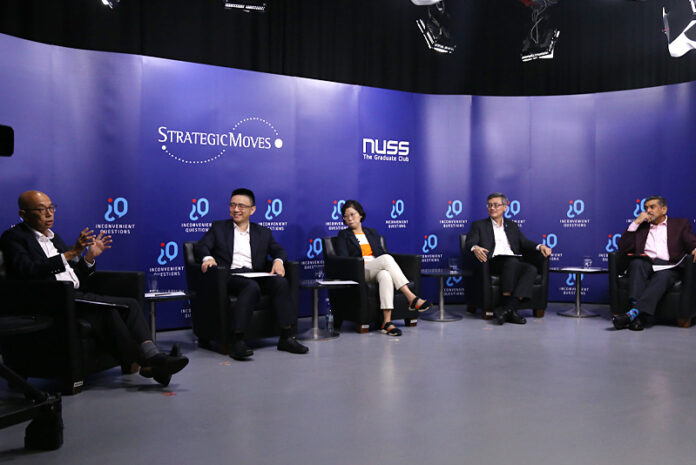The Inconvenient Questions (IQ) Special Panel Discussion was held on 3 Dec 2020, where Mr Viswa Sadasivan, Chief Editor of IQ and former Nominated Member of Parliament, led the panel discussion with esteemed guest speakers Prof Tan Eng Chye, President of National University of Singapore (NUS), Ms Aw Kah Peng, Chairman of Shell Companies in Singapore, Mr Ye Gang, Group Chief Operating Officer of Sea Group, and Mr Han Fook Kwang, Editor-at-large of The Straits Times.
A good university degree was all you needed in the past, but that’s not the case now. Many universities are moving into interdisciplinarity, with the emphasis on experiential learning and an all-rounded education. Interdisciplinarity or interdisciplinary studies involve the combination of two or more academic disciplines into one activity, and draws knowledge from several fields, thus encouraging thinking across boundaries.
The discussion began with these thoughts and then the 360 participants, who had tuned in online, witnessed the experts bringing to light the new education trends.
Interdisciplinarity in the real world
Hiring companies no longer look at candidates’ grades, but on whether they have a learner’s mindset. Based on her experience, Ms Aw explained that companies look at how the person could add value to the company’s culture and for an instinct for learning as this would ultimately bring success to both the individual as well as the company.
Mr Ye Gang advocated lifelong learning, especially in interdisciplinarity. With an engineering background, he shared how despite obtaining poor grades in psychology and economics, the experiences he went through transformed him as he joined the workforce. He said, “grades mean nothing once you leave school, but experiences stay with you for life. Dare to try, don’t be afraid to fail. Study subjects that can widen your scope of knowledge.”
Additionally, with the job landscape changing, and technology advancing, some jobs may no longer be relevant. “Therefore, universities have to find a way to instil in students – character building, critical thinking skills, deductive reasoning, the ability to innovate, problem-solving and knowing how to deal with changes. Students must know how to join the dots and reach a conclusion that is reasonably sound even without all the knowledge,” concurred Prof Tan.
Paving the way for graduates
Mr Han shared a survey by Qualtrics showing Singaporean workers’ engagement and motivation at only 47%, one of the lowest in Asia.
“Universities should link up with industries to see what can be done and work closely to help develop motivation in students and become productive individuals. A person entering university should be a transformed person after graduation, with the acquisition of skills and knowledge, as well as having learnt values, context and situational awareness,” he said.
Are universities future-ready?
A polytechnic student in attendance asked if universities could provide a recharging point for working individuals to head back to university to keep up to date with the latest industry developments.
Ms Aw shared how merely providing courses did not necessarily drive people to learn. She said, “the reality is once you are done with the critical training, the rest becomes harder — people don’t have time to commit, and the desire and passion to learn gets affected once in the workplace.”
Mr Ye added that Singaporean parents are pragmatic and tend to send their children to study in industries with well-paying jobs. However, learning does not end there. In fact, he agreed that the current structured university system needs to be more versatile, letting people enter university as and when according to their needs.
Be tomorrow-ready
While Singapore universities are world-class, the current system needs to adjust in order to prepare graduates to stand out in the real world. As Mr Sadasivan summed up, “Singapore universities need to be more progressive in not only providing the wisdom but being responsible in shaping the demand in order to progress. Nobody knows what the future holds, and the universities are doing the best they can.”
In case you missed the event, catch it here.







